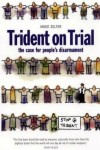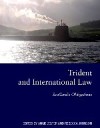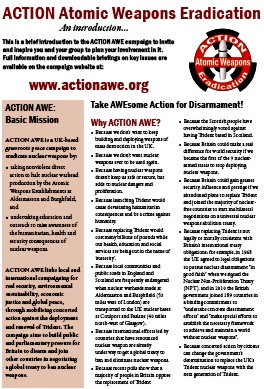
Click image above to read, download or print a 4 page PDF Introduction to Action AWE, designed for information distribution. Printed copies can be supplied to you if quantities are needed for an event or venue, please let us know what you need.
A smaller black and white flyer is also available on our Publicity Materials page, found under Resources.
This is a brief introduction to the ACTION AWE campaign to help you and your group plan your involvement in it. Full information and downloadable briefings on key issues are available on this website via the menu bar at the top of this page.
ACTION AWE: Basic Mission
Action AWE is a UK-based grassroots peace campaign dedicated to banning and eradicating nuclear weapons. We have come together as groups and individuals to undertake nonviolent action, education and outreach to raise awareness of the humanitarian, health and security consequences of nuclear weapons and halt nuclear warhead production by the Atomic Weapons Establishment nuclear bomb facilities at Aldermaston and Burghfield. Linking local and international campaigning for sustainable security, environmental protection, economic justice and peace, Action AWE mobilises for concerted, persistent, politically effective actions to highlight and prevent the deployment and renewal of Trident, and to build public and parliamentary pressure for Britain to disarm and join other countries in negotiating a global treaty to ban nuclear weapons.
Take AWEsome Action for Disarmament!
Why ACTION AWE?
- Because we don’t want to keep building and deploying weapons of mass destruction in the UK.
- Because nuclear weapons are immoral, inhumane and unnecessary.
- Because Britain’s nuclear policies lead to violations of international law.
- Because concerted action by citizens can change the government’s determination to replace the UK’s Trident nuclear weapons with the next generation of Trident.
- Because replacing Trident would cost many billions of pounds while our health, education and social services are being cut in the name of ‘austerity’.
- Because having nuclear weapons doesn’t keep us safe or secure, but adds to nuclear dangers and proliferation.
- Because we don’t want nuclear weapons ever to be used again.
- Because launching Trident would cause devastating humanitarian consequences and be a crime against humanity.
- Because local communities and public roads the length and breadth of England and Scotland are endangered on a frequent basis because nuclear warheads made at Aldermaston and Burghfield (50 miles west of London) are transported up to the UK nuclear bases at Coulport and Faslane, 40 miles north-west of Glasgow.
- Because the Scottish people have overwhelmingly voted against having Trident based in Scotland.
- Because recent polls show that a majority of people across the whole British Isles oppose the replacement of Trident (63%, according to 2010 BPIX/Mail on Sunday poll, quoted in ‘Cut Trident and its Replacement’ www.cnd.org.uk)
- Because Britain could make a real difference for world security if we became the first of the 9 nuclear-armed states to stop deploying nuclear weapons
- Because international efforts led by countries that have renounced nuclear weapon are already underway to get a global treaty to ban and eliminate nuclear weapons for everyone.
- Because Britain could gain great prestige and security if we abandoned plans to replace Trident and joined the majority of nuclear-free countries to start multilateral negotiations on a universal nuclear weapons abolition treaty.
- Because the skills of people working at Aldermaston and Burghfield are needed for verifying disarmament agreements, dismantling existing nuclear warheads and finding safe and secure ways to dispose of the radioactive and toxic materials that have been created by decades of nuclear arms production.
- Because replacing Trident is not legally or morally consistent with Britain’s international treaty obligations: for example, in 1968 the UK agreed to legal obligations to pursue nuclear disarmament “in good faith” when we signed the Nuclear Non-Proliferation Treaty (NPT), and in 2010 the British government joined 189 countries in a binding commitment to “undertake concrete disarmament efforts” and “make special efforts to establish the necessary framework to achieve and maintain a world without nuclear weapons”.
- Add your own reasons…
Britain has over 180 nuclear warheads in its current nuclear weapons system, known as Trident. The nuclear submarines that carry Trident are getting old, so the government has pledged to finalise contracts to replace them in 2016 in order to build a new generation of UK nuclear weapons at an estimated cost of £76–100 billion. This is more than the current planned public spending cuts of £81 billion. In that event, the warheads would be designed and manufactured at AWE (Atomic Weapons Establishment) Aldermaston and Burghfield, in Berkshire, about 50 miles west of London (near M4 junctions 11 and 12)
There will be a new government in 2016, formed out of Members of Parliament elected at the next General Election, which has to be held some time before May 2015. As shown by Trident Ploughshares and Faslane365 in the run-up to the 2007 Scottish elections, the more we can mobilise citizens to take concerted actions against Trident, the harder it will be for MPs and political parties that wish to spend our money on replacing Trident to get elected.
Replacing Britain’s nuclear arsenal is completely unnecessary and would be hugely expensive, at a time of drastic budget cuts to other services, such as health, education, social and disability services, that are vital for people’s real security. Britain clings to nuclear weapons as part of a colonialist legacy based on “punching above our weight” internationally. This mentality means that UK governments spend a higher proportion of public money on military equipment than almost all equivalent governments do. It also means that UK governments are far more likely to resort to military action and wars instead of investing in less violent (and more effective) ways to resolve conflicts, help oppressed people and build peace, as illustrated recently in Iraq and Afghanistan. Britain’s involvement in wars of choice and military interventions have caused thousands of deaths and injuries and untold misery to people living in those countries, as well as destroying the lives of young men and women who have been sent overseas on behalf of the armed forces and who have been killed, maimed or psychologically devasted as a consequence. Militarism, including the manufacture, deployment and use of weapons, poisons and endangers our environment. This is particularly egregious with regard to all aspects of the nuclear chain, from uranium mining to nuclear testing, uranium and plutonium production, warhead manufacture, nuclear power and waste.
Nuclear weapons are linked to every major economic, health, environmental, political and moral issue facing us today. Trident replacement links directly with concerns about the climate, poverty and militarism, and our relationships with people and governments of other countries now and in the future. Whatever concerns you most, replacing Trident will add to the problems we face and make it more difficult to find collective solutions.
ACTION AWE offers the opportunity to say and do something about these issues, making your own connections through your own autonomous actions and publicity, while linking in with a growing national and international movement.
Ban the Bomb, Get the Treaty!
If we want our actions to count, there has never been a more important time to shift the British debate and get rid of nuclear weapons once and for all.
Many countries have renounced the option to make and have nuclear weapons. They have chosen alternative ways to provide deterrence and security for their people. Frustrated and angry that a handful of countries like Britain keep on endangering world security by making and deploying these appalling weapons of mass destruction, a growing number of nuclear-free countries are now taking the lead to get negotiations started on a global treaty to ban nuclear weapons – building on the treaties that have banned biological and chemical weapons. They aim to make this happen by 2015.
So persistent, concerted actions undertaken from 2013 at AWE Aldermaston and Burghfield would boost these international efforts and add to pressure on the British government from leading nuclear-free countries, including Norway, Switzerland, Ireland, Denmark, New Zealand, South Africa, Malaysia, Chile, Indonesia, Mexico and Nigeria.
When the UK tested its first nuclear weapon in 1952 there were only 2 other nuclear nations, the US and Soviet Union. Now, 20 years after the Cold War ended, there are 9 nuclear-armed countries, including China, North Korea, Israel, India, Pakistan and France. And others like Iran and Saudi Arabia are pursuing nuclear power programmes that they might in the future use to make nuclear weapons. The ‘responsible’ nuclear weapon states like Britain, the United States and Russia were expected to take the lead in fulfilling their nuclear disarmament obligations when the Cold War ended. Though they have reduced the size of some arsenals and declared their commitments to make the world nuclear free, the US and Russia are still renewing and modernising their nuclear weapons, just as Cameron and Clegg want to do by replacing Trident.
The nuclear-free countries have finally realised that the only way to get legally binding nuclear disarmament is to take the lead themselves. They have decided to do this because nuclear weapons threaten everyone’s security. They are not just the business of countries that have them, as assumed in the past. On the contrary, the nuclear-armed states are like addicts who need help from those who aren’t addicted in order to take the right and necessary steps to let go of the value and excitement they attached to these dangerous dependencies.
Working with a growing network of non-government organisations and campaigners concerned about humanitarian, environmental and disarmament issues including the international Red Cross, a leading group of nuclear-free countries are now highlighting the humanitarian consequences of nuclear weapons. While most people know that all-out nuclear war would be catastrophic, new research shows that even a ‘small scale’ or ‘regional’ nuclear war between two nuclear-armed countries would create catastrophic global consequences, including nuclear winter, global famine and widespread environmental contamination and destruction.
The International Campaign to Abolish Nuclear Weapons (ICAN), together with doctors and scientists, has taken the lead to reframe the need for disarmament as a humanitarian issue. Norway will be holding a major international conference on this in Oslo in March 2013, inviting governments and civil society. ICAN UK is part of a network of UK organisations (including CND, Medact and the Acronym Institute for Disarmament Diplomacy) that will raise these issues with the British government.
President Obama and other nuclear-armed leaders have said they want the peace and security of a world without nuclear weapons, but they are having difficulty taking the first steps themselves. On the basis that foreseeable “catastrophic humanitarian consequences” make nuclear weapons everyone’s business, and that legal steps have to be taken to prevent nuclear weapons ever being used again, there is now a real chance that non-nuclear governments will take the first steps to start negotiations for an international ban on the use, production and transport of nuclear weapons.
By not replacing the Trident nuclear weapons system, Britain could lead the way in showing that nuclear weapons are not useful, acceptable or necessary for deterrence and security. Instead of making nuclear warheads, Aldermaston could lead the way in verifying disarmament. Instead of continuing to undermine our non-proliferation treaty obligations, Britain could contribute positively towards getting this much-needed multilateral disarmament treaty. We have an opportunity, right now, to make this happen.
But the government won’t take that opportunity unless pushed to do so. Although the majority of British people – including the majority of serving and retired officers in the armed forces – believe that Trident should not be replaced, no-one is going to do anything about stopping this expensive mistake unless we the people make the issue highly visible and contentious before the next general election.
The best way to do that is by upping the stakes with persistent, concerted, high visibility actions at AWE Aldermaston and Burghfield, involving people from all regions and all walks of life.
Take ACTION – People Power Works
Creative and concerted campaigns by ordinary people around the world and throughout history have made a difference.
- After decades of politely debating women’s suffrage, it took direct action by the suffragettes to win votes for women.
- Mass nonviolent non-cooperation by Indian people led by Mahatma Gandhi was decisive in the struggle for Indian independence from Britain’s colonial rule.
- Concerted, persistent civil disobedience by African-Americans faced with unjust and racist laws compelled changes in US laws and society fifty years ago, making it possible for a Black man to stand for president in 2008 and get elected.
- The persistence and nonviolent actions of women involved in the Greenham Common Women’s Peace Camp from 1981 played the most high profile and targeted role in the European-wide peace movement that pressured and enabled US and Soviet leaders to pull back from the Cold War nuclear arms race, resulting in the 1987 Intermediate Nuclear Forces (INF) Treaty that took the nuclear-armed cruise missiles out of Britain – and Europe – for good. Everyone at the time told the Greenham women that they were doomed to fail. If you go to Greenham now (it’s a few miles west of Aldermaston) you’ll see ponies and sheep grazing on restored Common land, in front of the empty nuclear weapon silos.
These profound political and social changes would not have been possible without active resistance and nonviolent actions undertaken with courage and persistence by responsible citizens.
More recently…
- Faslane 365, which coordinated a year of nonviolent blockades at the Faslane nuclear base in Scotland (2006-2007), showed how many different people could become part of a large, successful year-long action that magnified public awareness and mobilised civic and political action against nuclear weapons in Scotland, ousting Scottish Labour from government in 2007 because it supported the decision by Tony Blair and the UK Labour Party to replace Trident. As with ACTION AWE, Faslane 365 mobilised many different individuals and groups to take autonomous action on the basis of some basic demands and principles, with a small group providing initial coordination and facilitation support.
- Germany’s 2011 decision to phase out nuclear power stations followed decades of nonviolent actions and opposition by German environmental and anti-nuclear groups, including the historic Gorleben Castor blockades of nuclear waste trains. Huge mobilisations of the local community and anti-nuclear activists from around Germany and other countries would gather whenever nuclear waste trains were scheduled to pass through the Gorleben area (2-3 times a year) and block the tracks. Despite heavy policing, the activists have been successful each year in delaying the convoy and their actions have increased German awareness and public pressure for Germany to halt its nuclear power programmes. [link to Gorleben website]
ACTION AWE - YOUR ACTION!
Starting early in 2013 and running at least to the next election, Action AWE is inviting people from around Britain and beyond to come to Berkshire and take creative, disruptive, disobedient, fun and exciting action against the Atomic Weapons Establishment at Aldermaston and Burghfield, and show opposition to the making of warheads and replacement of Trident.
Be creative! Be inspired! Be imaginative! Be daring! ACTION AWE is about your community, campaign, or affinity group seizing the opportunity to tell the rest of the UK and the world why you believe we shouldn’t replace Britain’s nuclear arsenal with a new generation of weapons of mass destruction. Use your actions to say what you want instead, whether in terms of how the money should be spent, or what kind of security you value, or how you want Britain’s role in the world to change, or however you want to make the connections. Explain or show how replacing Trident will contribute to the problems that your group is campaigning on, whether that’s climate change, the cuts, women’s rights, national and global militarisation, human rights, poverty.
Publicise your action as widely as possible (if you’re doing something secret you don’t have to advertise in advance, just make sure you have friends ready to do the media work as soon as the action begins for more media tips check the website!)
It’s up to you to organise your own actions. The ACTION AWE website has all the information you need to plan and organise a demonstration or direct action: maps and local information, history and current activities of AWE Aldermaston and Burghfield, as well as local information about transport and accommodation. You will also be able to download more information about issues and other campaigns that link in with ACTION AWE, as well as basic legal information and links to legal support groups, tips on media work, a calendar if you want to publicise your action before – or more probably after you’ve taken it, and pages where you can post your press releases, publicity, information & photos
MAKE YOUR ACTION NONVIOLENT
The initiators of ACTION AWE believe that the means we use must be consistent with our objectives of peace, justice and a sustainable environment for life on earth. We can provide preparation and training for people who are new to nonviolent campaigning. For actions supporting and linking with ACTION AWE’s disarmament objectives we ask that you respect and act in accordance with these nonviolence guidelines:
- Respect and care for everyone involved, including those representing or defending opposing positions and/or military facilities.
- Refusal to harm, damage or degrade people.
- Refusal to carry any weapon or use physical or verbal abuse against others.
- Recognition that no one has a monopoly on truth, everyone is capable of change, and communication and dialogue are important for understanding others’ positions and concerns.
- Connect with the fundamental humanity and good in everyone, whatever side of the issue they are on.
- Be fully responsible, self-conscious and accountable for ourselves when undertaking nonviolent campaigns and actions, best ensured by not clouding our judgement with alcohol or drugs.
- We seek to prevent and avoid harm to everyone involved, including ourselves, but there may be situations in which suffering is inevitable; in that case all efforts must be taken to prevent suffering being inflicted on others, even if that means taking it on ourselves.
- We do our best to provide each other with support to ensure that our behaviour is as nonviolent and careful as possible.
For more information or help you can’t find on this website please contact us at Action AWE

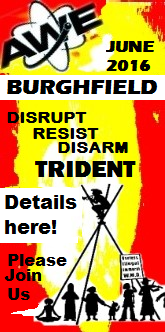
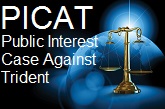
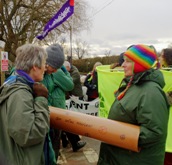








 Nuclear weapons crime in the UK has been reported to Thames Valley Police.
Nuclear weapons crime in the UK has been reported to Thames Valley Police.







